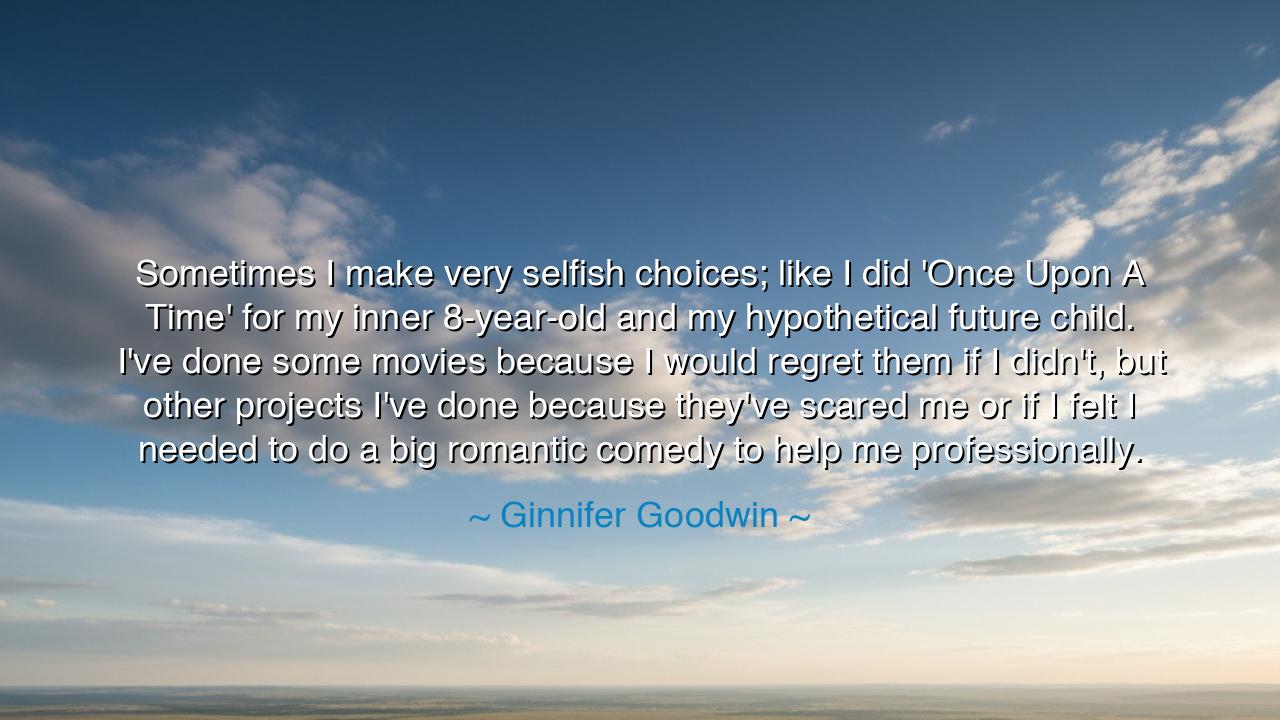
Sometimes I make very selfish choices; like I did 'Once Upon A
Sometimes I make very selfish choices; like I did 'Once Upon A Time' for my inner 8-year-old and my hypothetical future child. I've done some movies because I would regret them if I didn't, but other projects I've done because they've scared me or if I felt I needed to do a big romantic comedy to help me professionally.






In the words of Ginnifer Goodwin, “Sometimes I make very selfish choices; like I did Once Upon A Time for my inner 8-year-old and my hypothetical future child. I’ve done some movies because I would regret them if I didn’t, but other projects I’ve done because they’ve scared me or if I felt I needed to do a big romantic comedy to help me professionally.” These words reveal the journey of an artist, but also the path of every soul: the balance between duty and desire, between what is done for the self and what is done for the world. In them, we hear the voice of honesty, of vulnerability, and of courage.
To make selfish choices is often spoken of as a flaw, yet here it is confessed with wisdom. For sometimes, the soul must choose not for the applause of others, nor for worldly gain, but for the nourishment of the child within—the inner 8-year-old who still dreams, who still marvels, who remembers why joy matters. To honor that child is not selfishness in the truest sense, but preservation of the heart’s vitality. If one ignores that voice, the adult becomes hollow, achieving much yet feeling little. Goodwin reminds us that even in greatness, the child must be cared for.
She also speaks of the hypothetical future child—a symbol not only of her own family yet to come, but of legacy itself. For we do not create only for ourselves, but for those who may follow. To take part in stories like Once Upon A Time is to weave narratives that a new generation might cherish, that one’s children, or the children of strangers, may one day look upon with wonder. Here, the selfish choice becomes selfless, for in feeding her own joy, she plants seeds for others.
The mention of regret is key, for regret is the shadow that falls when courage is denied. Goodwin admits to seizing certain roles because she feared she would mourn their absence later. This is not weakness, but foresight. The ancients taught that opportunity is like the winged god Kairos—swift, fleeting, impossible to grasp once he has passed. To act before regret takes root is wisdom, for inaction leaves scars deeper than failure. Better to try and fall than to stand still and lament forever.
And then there is the confession of taking roles because they scared her. Here lies the essence of growth. To walk only on safe roads is to remain unchanged; to step into fear is to be transformed. From the warriors of old to the explorers who set sail into uncharted seas, greatness has always been found where the heart trembles but does not turn back. By choosing projects that frightened her, Goodwin embraced the ancient truth: fear is not a barrier, but a signpost that points to growth.
Yet she also admits to choosing a romantic comedy not for passion or fear, but for the demands of profession. Here, too, lies wisdom. For though the heart must be fed, and though fear must be faced, the world also demands pragmatism. To sustain one’s path, there are times when choices are made not for joy or growth, but for stability. This balance is part of life’s art: not every step will be heroic, not every deed will be transcendent, but together they weave a journey of both survival and meaning.
The lesson for us is this: do not despise the selfish choice, nor fear the scary path, nor reject the practical step. Each has its place in the great tapestry of life. Some choices feed the child within, some shape the legacy for those to come, some push us into growth, and some secure the road so that we may walk further. The wisdom lies not in avoiding these kinds of choices, but in discerning which is needed in each season of life.
And what should you do? Listen for the voice of your inner child and honor it with joy. Look to your future legacy and create something worthy of remembrance. Seize the paths that would leave you in regret if ignored, and walk boldly into what scares you. And yes, when necessary, choose the practical step that sustains your journey. In this balance lies the way of wisdom, the way of courage, and the way of a life fully lived.






AAdministratorAdministrator
Welcome, honored guests. Please leave a comment, we will respond soon